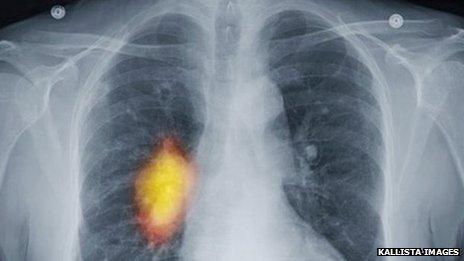Older cancer patients 'should not be written off'
- Published

The UK and Ireland have lower survival rates for many common cancers than their European peers
Older cancer patients should not be "written off" as too old for treatment, a charity has warned.
Macmillan Cancer Support said decisions on care should be made based on a patient's fitness, not their age.
It cited data which suggests 130,000 people over 65 diagnosed with cancer between 1991-2010 survived for more than 10 years.
NHS England acknowledged that it needed to deliver better services to people in the over-65 age group.
Macmillan Cancer Support conducted the research alongside the National Cancer Intelligence Network, found of the 130,000 who had lived with the disease for more than a decade, 8,000 had been diagnosed over the age of 80.
Despite that, many patients in the UK are being assessed on age alone, Macmillan said, adding that cancer survival rates in the age group are "poor".
'Care and respect'
A paper published in the Lancet, looking at five-year survival rates for common cancers - including prostate, breast, lung, stomach, ovary and kidney cancers - between 1999 and 2007 showed the UK and Ireland had a lower five-year survival rate than the rest of Europe.
"It's wrong to write off older people as too old for treatment," said Macmillan Cancer Support's chief executive Ciaran Devane.
"With a proper assessment and appropriate treatment, our research shows that many older cancer patients can live for a long time and can even be cured.
"While it's good news that so many older people are benefiting from treatment, many thousands more could live longer if our survival rates for over-65s matched those in comparable countries."
He said barriers to treatment, which include "age discrimination and inadequate assessment methods", must be addressed.
NHS England's national clinical director for cancer, Sean Duffy, said that with an ageing population, the study had come at an important moment in time.
But he added: "We need to deliver better services for people over 65 and 75 because we know there's an issue and interventions need to be designed to that end."
He said treatment for cancer can be complex "and should be based on what is right for each individual patient."
Dr Mark Porter of the British Medical Association said it should be a "key part" of the medical profession to ensure older patients are "treated with the care and respect they deserve".
- Published24 January 2014
- Published23 January 2014